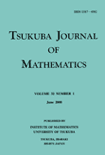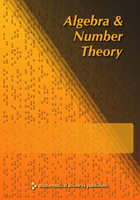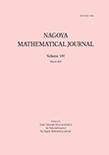
MICHIGAN MATHEMATICAL JOURNAL
metrics 2024
Pioneering Insights in the World of Mathematics
Introduction
The MICHIGAN MATHEMATICAL JOURNAL is a prestigious and influential publication in the field of mathematics, founded by the University of Michigan. With an ISSN of 0026-2285 and an E-ISSN of 1945-2365, this journal is recognized for its high-quality research and has achieved a commendable Q1 ranking in the category of Mathematics (miscellaneous) as of 2023. Published by the esteemed Michigan Mathematical Journal, it provides a platform for the dissemination of innovative mathematical theories and findings, playing a crucial role in advancing knowledge and scholarship within the mathematical community. With coverage spanning from 1996 to 2024, the journal emphasizes rigorous theoretical development and fosters collaboration among researchers, professionals, and students alike. While not an open-access journal, its contributions are invaluable for those looking to stay abreast of cutting-edge mathematical research.
Metrics 2024
 0.91
0.91 0.80
0.80 0.70
0.70 40
40Metrics History
Rank 2024
Scopus
IF (Web Of Science)
JCI (Web Of Science)
Quartile History
Similar Journals

Forum of Mathematics Sigma
Innovative research, limitless possibilities.Forum of Mathematics Sigma is a premier open access journal published by Cambridge University Press that has been at the forefront of mathematical research since its inception in 2013. With a strong emphasis on advancing the fields of mathematics, the journal consistently achieves Q1 rankings across multiple categories, including Algebra and Number Theory, Analysis, and Computational Mathematics. This distinction highlights its impact and relevance within the scholarly community. The journal prides itself on providing a platform for innovative research, fostering collaboration among researchers and practitioners across various mathematical disciplines. Open access publication ensures that cutting-edge findings are widely available to readers globally, enhancing the dissemination of knowledge. With an address in the heart of Cambridge, England, Forum of Mathematics Sigma is dedicated to promoting high-quality research and making significant contributions to the development of mathematics.

INTERNATIONAL JOURNAL OF MATHEMATICS
Fostering Global Discourse in MathematicsInternational Journal of Mathematics, published by World Scientific Publishing Co Pte Ltd, is a leading academic journal dedicated to advancing research in the field of mathematics. With an ISSN of 0129-167X and an E-ISSN of 1793-6519, this journal provides a platform for the dissemination of high-quality mathematical research and fosters academic discourse among mathematicians and professionals worldwide. Operating out of Singapore, International Journal of Mathematics boasts a respectable Q2 ranking in the 2023 Mathematics (miscellaneous) category, indicating its commitment to impactful scholarship. The journal publishes articles that cover a broad spectrum of mathematical topics, ensuring valuable insights for researchers, educators, and students alike. Despite not being an open-access journal, it maintains accessibility through established university and institutional subscriptions, furthering its influence in the mathematical community. The journal has continually evolved since its inception in 1996 and will continue to be a crucial resource for insightful mathematical explorations until at least 2024.

JOURNAL OF THE KOREAN MATHEMATICAL SOCIETY
Unveiling new ideas in the realm of mathematics.JOURNAL OF THE KOREAN MATHEMATICAL SOCIETY is a premier academic publication dedicated to advancing the field of mathematics through rigorous research and scholarly discourse. Published by the esteemed Korean Mathematical Society, this journal provides a platform for mathematicians and researchers to disseminate their findings, engage in innovative ideas, and connect with the global mathematical community. With an ISSN of 0304-9914 and E-ISSN 2234-3008, the journal has established itself as an important resource in the mathematical landscape, currently holding a Q3 classification in the ‘Mathematics (miscellaneous)’ category as per the 2023 rankings. Though not open access, the journal is committed to promoting high-quality contributions that span various mathematical disciplines, making it indispensable for students, researchers, and professionals alike. Operating from its base in Seoul, South Korea, it contributes to the international mathematics community by publishing cutting-edge research from 1997 to 2024 and beyond, facilitating an avenue for knowledge sharing and innovation in mathematics.

MANUSCRIPTA MATHEMATICA
Empowering the Next Generation of Mathematicians.MANUSCRIPTA MATHEMATICA is an esteemed journal in the field of mathematics, published by Springer Heidelberg. Since its inception in 1969, this journal has served as a pivotal platform for disseminating high-quality research in a variety of mathematical disciplines, with a commitment to advancing knowledge and fostering collaboration among mathematicians. The journal holds a commendable impact factor and is ranked within the Q2 category for Mathematics (miscellaneous) in 2023, placing it favorably among its peers in terms of academic influence. Although open access options are not available, its rigorous peer-review process ensures that published articles maintain the highest academic standards. With a wide scope covering significant areas of general mathematics, MANUSCRIPTA MATHEMATICA not only caters to researchers and professionals seeking innovative insights but also serves as a valuable resource for students eager to deepen their understanding of mathematical theories and applications. For those looking to contribute to or stay informed about advancements in this dynamic field, the journal remains a crucial resource for literature and discourse.

Tsukuba Journal of Mathematics
Elevating the Discourse in Mathematics for Global ImpactTsukuba Journal of Mathematics is a distinguished publication dedicated to advancing the field of mathematics through the dissemination of innovative research and comprehensive studies. Published by the University of Tsukuba, Department of Mathematics, this journal serves as a vital platform for mathematicians, researchers, and students to engage with cutting-edge mathematical theories and methodologies. Although currently not available as an open-access journal, it maintains a strong academic presence, contributing significantly to the global mathematical landscape. The journal invites submissions across various branches of mathematics, aiming to foster scholarly communication and collaboration. The ISSN 0387-4982 and the E-ISSN 2423-821X further establish its credibility and accessibility among the academic community, supporting its critical objective of facilitating high-quality research output. Situated in Tsukuba, Japan, a hub for scientific research and development, the Tsukuba Journal of Mathematics is committed to bridging gaps in mathematical knowledge and encouraging exploration of novel ideas.

Cambridge Journal of Mathematics
Fostering Collaboration Through Mathematical InquiryCambridge Journal of Mathematics, published by INT PRESS BOSTON, INC, is a premier platform for the dissemination of cutting-edge research in the field of mathematics. With an ISSN of 2168-0930 and E-ISSN 2168-0949, this journal stands out in a competitive academic landscape, currently ranked #58 out of 399 in General Mathematics, placing it in the top 15% within its category according to Scopus metrics. The journal serves as a vital resource for researchers, professionals, and students alike, aiming to foster groundbreaking mathematical inquiries and foster collaboration across disciplines. Published from 2020 to 2024, the Cambridge Journal of Mathematics is committed to maintaining high standards of scholarship, making it an essential read for those who are passionate about advancing mathematical knowledge and its applications.

Algebraic Geometry
Illuminating the Dynamics of Algebraic Structures and Geometric FormsAlgebraic Geometry, published by the European Mathematical Society, stands as a pivotal platform in the realm of modern mathematics, focusing on the intricate interplay between algebra and geometry. Since its inception in 2014, this Open Access journal has garnered significant attention, reflected in its prestigious rankings, including Q1 status in the categories of Algebra and Number Theory and Geometry and Topology, as per the 2023 metrics. With an impressive Scopus ranking of #18/119 in Algebra and Number Theory and #18/106 in Geometry and Topology, it ensures high visibility and accessibility of groundbreaking research. Based in Germany, at the esteemed Technical University of Berlin, the journal serves as a beacon for researchers, professionals, and students aiming to push the boundaries of knowledge in these dynamic fields. The scope of the journal encompasses diverse topics, including but not limited to, the latest developments in algebraic structures and geometric configurations, promising to enrich the academic discourse and foster innovation. As we converge towards its tenth anniversary in 2024, Algebraic Geometry continues to evolve and solidify its role as an essential resource for the mathematical community.

Algebra & Number Theory
Pioneering Research in Algebra and Number TheoryAlgebra & Number Theory, published by Mathematical Science Publications, stands at the forefront of mathematical research, particularly in the fields of algebra and number theory. With an ISSN of 1937-0652 and E-ISSN 1944-7833, this esteemed journal provides a dedicated platform for the dissemination of cutting-edge theoretical advances and practical applications. It has achieved a Q1 category ranking in both algebra and number theory according to the 2023 quartiles, reinforcing its critical role in shaping contemporary mathematical discourse. The journal serves as an essential resource for researchers, professionals, and students alike, offering insights into diverse mathematical methodologies and fostering open dialogue among scholars. Although it does not provide open access, its robust impact factor reflects the high quality and relevance of its published work. Based in the United States at the University of California, Berkeley, the journal's commitment to excellence continues to attract contributions that push the boundaries of mathematical understanding.

NAGOYA MATHEMATICAL JOURNAL
Pioneering Research for a Global Mathematical CommunityNAGOA MATHEMATICAL JOURNAL, published by Cambridge University Press, is a prestigious journal that has been at the forefront of advancing mathematical scholarship since its inception in 1950. With an ISSN of 0027-7630 and an E-ISSN of 2152-6842, this journal has gained recognition for its high-quality research contributions in the field of mathematics, achieving a Q1 classification in Mathematics (miscellaneous) as of 2023. The journal’s impact is further reflected in its Scopus rank of #164 out of 399 in the General Mathematics category, positioning it within the 59th percentile of its peers. Scholars, researchers, and students can access a range of innovative mathematical studies that explore diverse topics, fostering a vibrant dialogue within the mathematical community. By catering to a global audience, the NAGOYA MATHEMATICAL JOURNAL continues to play a critical role in shaping contemporary mathematical discourse and research.

ANNALES DE L INSTITUT FOURIER
Elevating Mathematical Discourse GloballyANNALES DE L INSTITUT FOURIER is a premier academic journal published by ANNALES INST FOURIER, specializing in the fields of Algebra and Number Theory as well as Geometry and Topology. Since its establishment, the journal has garnered a distinguished reputation, evidenced by its Q1 quartile ranking in the 2023 category assessments and its Scopus Rank of #37 out of 119 in Algebra and Number Theory, and #34 out of 106 in Geometry and Topology, placing it within the top percentile of its field. The journal serves as a vital platform for disseminating groundbreaking research and innovative methodologies, catering to a global audience of researchers, professionals, and students. With a commitment to the advancement of mathematical sciences, ANNALES DE L INSTITUT FOURIER invites contributions that push the boundaries of knowledge and foster collaboration across disciplines. Although it does not offer open access, the rigorous peer-review process ensures that published papers meet the highest academic standards, making it a critical resource for anyone engaged in advanced mathematical research.